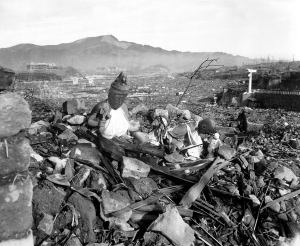By Katherine E. McKinney, Scott D. Sagan, Allen S. Weiner | July 1, 2020
In his first radio address after the bombing of Hiroshima, President Harry S. Truman claimed that “[t]he world will note that the first atomic bomb was dropped on Hiroshima, a military base. That was because we wished in this first attack to avoid, insofar as possible, the killing of civilians.”[1] This statement was misleading in two important ways. First, although Hiroshima contained some military-related industrial facilities, an army headquarters, and troop loading docks, the vibrant city of over a quarter of a million men, women, and children was hardly “a military base” (Stone 1945). Indeed, less than 10 percent of the individuals killed on August 6, 1945 were Japanese military personnel (Bernstein 2003). Second, the US planners of the attack did not attempt to “avoid, insofar as possible, the killing of civilians.” On the contrary, both the Target Committee (which included Robert Oppenheimer and Maj. Gen. Leslie Groves of the Manhattan Project) and the higher-level Interim Committee (led by Secretary of War Henry Stimson) sought to kill large numbers of Japanese civilians in the attack. The atomic bomb dropped on Hiroshima was deliberately detonated above the residential and commercial center of the city, and not directly on legitimate military targets, to magnify the shock effect on the Japanese public and leadership in Tokyo.
What were the legal considerations and moral reasoning used in 1945 to justify the attack on Hiroshima? Could such considerations and reasoning be used again in the future?




